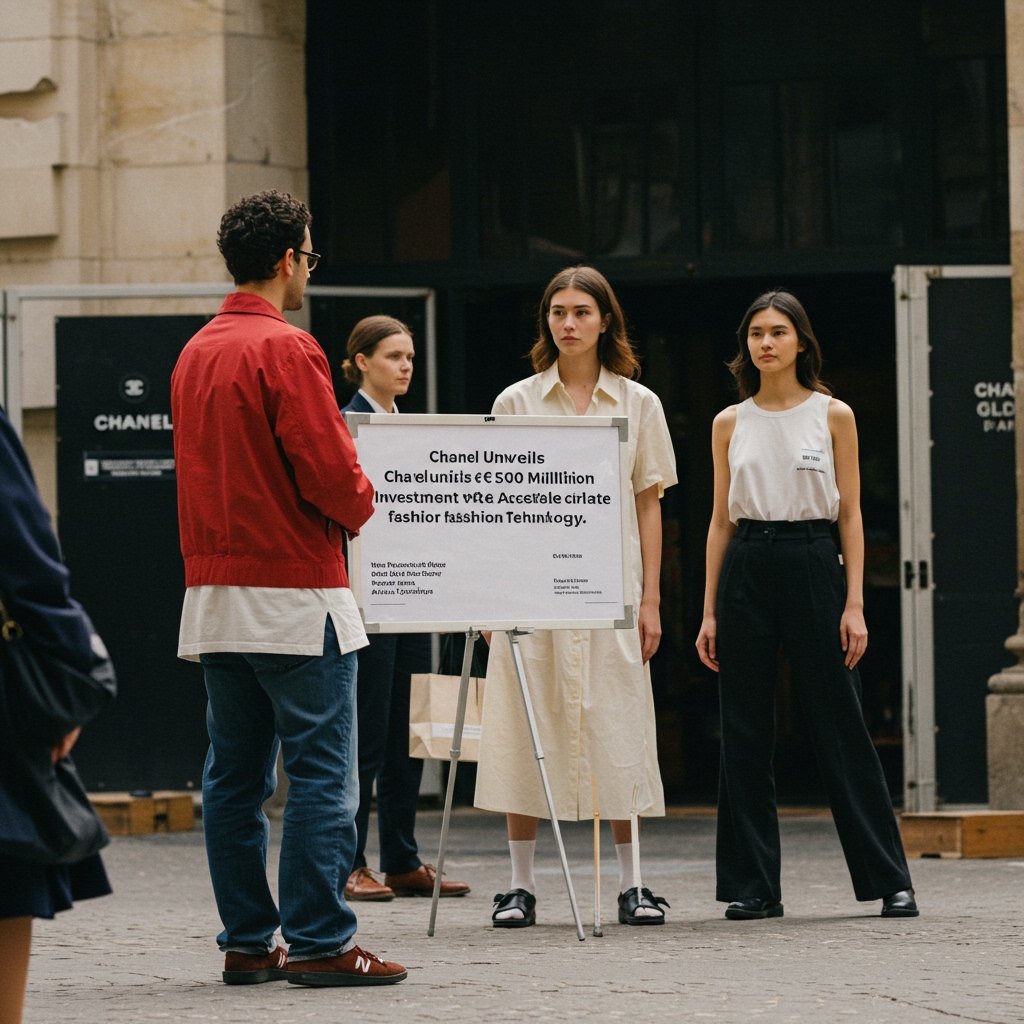Chanel, a global leader in luxury fashion, has announced a substantial financial commitment aimed at revolutionizing its approach to sustainability through advanced technological solutions. On January 22, 2025, the esteemed house revealed a dedicated investment of €50 million towards accelerating initiatives within the realm of circular fashion. This significant capital injection is earmarked to support the development and implementation of cutting-edge textile recycling and material reuse technologies, marking a pivotal moment in the brand’s ongoing efforts to reduce its environmental footprint and champion more sustainable practices across its intricate global supply chain. The announcement signals a clear strategic direction for Chanel, emphasizing the importance of innovation and collaboration in achieving ambitious sustainability targets within the high-fashion sector.
A Strategic Pivot Towards Circularity
The fashion industry, particularly its luxury segment, faces increasing scrutiny regarding its environmental impact, from resource consumption in production to waste generation at the end of a product’s life cycle. Traditional linear models of production – take, make, dispose – are no longer viable in the face of pressing climate and environmental challenges. A circular economy approach, which focuses on keeping materials in use for as long as possible through recycling, reuse, and regeneration, offers a pathway towards a more sustainable future. For luxury brands, preserving material quality, craftsmanship, and brand integrity while implementing circular processes presents unique complexities. Chanel’s €50 million investment represents a strategic acknowledgment of these challenges and a proactive step towards embracing circular principles not just as a compliance measure, but as a core element of its innovation and future strategy. It underscores a growing recognition within the high-fashion world that sustainability must be integrated into the very fabric of business operations, from initial design and sourcing through to end-of-life solutions for garments and accessories.
The €50 Million Commitment
The scale of the €50 million investment by Chanel is noteworthy. It represents a significant commitment of capital specifically dedicated to advancing technological capabilities for circularity. This is not merely a minor allocation for pilot projects, but a substantial financial pledge designed to drive tangible, scalable change within the company’s operations and potentially influence the broader industry. Such a significant sum allows for dedicated research, development, and the necessary infrastructure required to process complex luxury materials, which often involve blends of natural fibers, synthetics, and intricate embellishments. The investment is intended to facilitate the transition from current material management practices to more sophisticated, technology-driven recycling and reuse systems, aiming to significantly reduce waste and decrease the reliance on virgin resources. This financial commitment underscores the seriousness with which Chanel is approaching its sustainability goals, positioning technological innovation as a key enabler of its circular transition.
Partnership with RenewCycle Inc.
A central component of this investment is a strategic partnership with RenewCycle Inc., a promising startup specializing in renewable textile technology. While specific details of RenewCycle Inc.’s proprietary processes were not extensively disclosed, their focus lies in developing innovative methods for breaking down textile waste and transforming it back into usable fibers or materials. Partnering with a dedicated technology firm like RenewCycle Inc. allows Chanel to leverage specialized expertise and cutting-edge scientific advancements that are critical for effectively recycling complex textile waste generated by high-fashion products. This collaboration is expected to accelerate the research and development phase, moving novel concepts from the lab to industrial-scale application. The partnership signifies a recognition that achieving ambitious circularity goals requires external collaboration and tapping into the specialized knowledge base of technology innovators focused specifically on textile regeneration. It is a model that could prove crucial for the luxury sector, where unique material compositions demand tailored recycling solutions.
Piloting Innovation in Europe
The multi-year program funded by this investment will initially be piloted in Europe. Europe is often at the forefront of environmental regulations and sustainability innovation, making it a strategic location for testing and refining new circular processes. The program’s core objective is to develop and implement innovative processes specifically for textile recycling and material reuse. This involves creating systems capable of handling a variety of materials used in Chanel’s collections, from fine silks and tweeds to leather and composite materials. The aim is to integrate these new recycling and reuse streams directly into Chanel’s supply chain. This means exploring how returned goods, manufacturing waste, or even post-consumer textiles (where applicable and feasible for luxury) can be collected, processed using the new technologies, and re-introduced into the production cycle, either for the same product lines or new applications. The pilot phase in Europe will be crucial for evaluating the effectiveness, scalability, and economic viability of these technologies before potential expansion to other regions or integration across the entire global supply chain. It allows for focused testing and refinement in a key market.
Long-Term Vision: Sustainability by 2028
Chanel’s significant investment and the establishment of this partnership and pilot program are intrinsically linked to the house’s broader strategic focus on reducing environmental impact and enhancing sustainability practices. This move is presented as a critical step towards achieving these overarching goals within the high-fashion sector, with a clear eye on progress by 2028. While the €50 million program itself is multi-year and begins with a pilot, its successful implementation is positioned as instrumental in contributing to Chanel’s ability to meet its sustainability targets within the specified timeframe. By investing in textile recycling and material reuse technology, Chanel aims to close the loop on its materials, minimize waste sent to landfill or incineration, reduce the demand for virgin raw materials, and ultimately lower the environmental footprint associated with its production processes. This strategic alignment highlights how technological investment is viewed not as an isolated initiative, but as a fundamental enabler for the brand’s long-term vision of sustainable luxury by 2028.
Implications for the Luxury Sector
As one of the world’s most influential luxury brands, Chanel’s substantial investment in circular fashion technology sends a powerful signal to the entire high-fashion industry. It demonstrates that investing heavily in sustainable innovation is becoming a strategic imperative, even for houses known for their exclusivity and traditional craftsmanship. This move could encourage other luxury brands to accelerate their own sustainability initiatives and explore similar technological solutions for textile recycling and material reuse. It validates the potential of startups like RenewCycle Inc. and highlights the need for cross-industry collaboration to tackle complex environmental challenges. Chanel’s leadership in this area could help set new standards and accelerate the adoption of circular practices across the luxury sector, fostering a more sustainable future for high fashion.
In conclusion, Chanel’s announcement on January 22, 2025, of a €50 million investment and partnership with RenewCycle Inc. represents a landmark commitment to advancing circular fashion through technological innovation. This multi-year program, initially piloting in Europe, is poised to develop and implement crucial systems for textile recycling and material reuse across the brand’s supply chain. By making this significant financial and strategic move, Chanel underscores its dedication to reducing environmental impact and enhancing sustainability practices within the luxury sector, firmly integrating circularity into its long-term vision targeted for progress by 2028.





